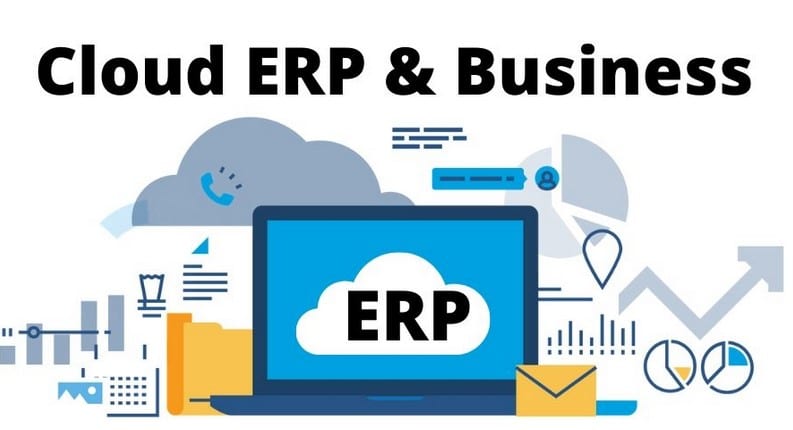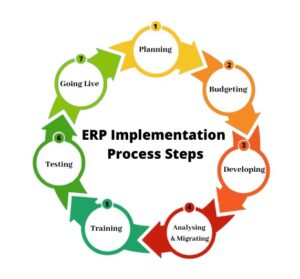In today’s rapidly evolving business landscape, staying ahead of the curve is essential. One technology that has revolutionized the way companies operate is Cloud Enterprise Resource Planning (ERP). In this comprehensive article, we will delve into the world of Cloud ERP and discuss 25 strategies that can transform your business. From improved efficiency to enhanced decision-making, Cloud ERP offers a plethora of benefits that can help your organization thrive in the digital age.
In this section, we will explore the fundamental concept of Cloud ERP and how it can drive transformation in your business.
Understanding Cloud ERP
Cloud Enterprise Resource Planning (ERP) is a game-changing technology that has transformed the way businesses manage their operations. In this section, we will delve deeper into the concept of Cloud ERP, exploring its key components, benefits, and how it can revolutionize your organization.
what is an erp?
At its core, Cloud ERP is a comprehensive software solution designed to streamline and optimize various core business functions. These functions include but are not limited to finance, human resources, supply chain management, and customer relationship management. what is an erp apart from traditional on-premises ERP systems is its cloud-based infrastructure.
In a Cloud ERP system, all your critical business data and processes are hosted on remote servers maintained by a trusted third-party provider. This means that you no longer need to invest in and manage your own IT infrastructure, servers, and software. Instead, you access the ERP system via the internet, from anywhere with an internet connection, and on a variety of devices.
Key Components of Cloud ERP
- 1. Software as a Service (SaaS): Cloud ERP is typically delivered as a Software as a Service (SaaS) model. This means that you subscribe to the ERP software on a pay-as-you-go basis, which is more cost-effective than traditional licensing models.
- 2. Data Center: The heart of Cloud ERP lies in the data center. These data centers are equipped with state-of-the-art infrastructure, ensuring the security, scalability, and reliability of your business data.
- 3. Accessibility: With Cloud ERP, your data and applications are accessible 24/7, promoting collaboration among remote teams and allowing employees to work from virtually anywhere.
- 4. Security Measures: Cloud ERP providers invest significantly in security measures, including data encryption, regular backups, and robust authentication protocols, ensuring the safety of your sensitive business information.
- 5. Scalability: As your business grows, Cloud ERP can effortlessly scale to accommodate increased data and user requirements. This scalability ensures that your ERP system remains aligned with your organization’s evolving needs.
Benefits of Embracing Cloud ERP
The adoption of Cloud ERP offers a multitude of advantages for businesses of all sizes:
- 1. Cost-Efficiency: Cloud ERP eliminates the need for hefty upfront investments in hardware and software. You pay for what you use, making it cost-effective.
- 2. Scalability and Flexibility: As mentioned earlier, Cloud ERP scales effortlessly, ensuring that it can accommodate your organization’s growth and changing needs.
- 3. Accessibility: With Cloud ERP, your employees can access vital business data and applications from their homes, on the road, or anywhere with an internet connection. This accessibility promotes flexibility and remote work capabilities.
- 4. Real-Time Insights: Cloud ERP provides real-time data and analytics, enabling you to make informed decisions promptly. This real-time visibility into your business operations is invaluable.
- 5. Enhanced Security: Cloud ERP providers invest significantly in cybersecurity measures, often surpassing what individual businesses can afford. This means your data is well-protected from cyber threats.
Transforming Business Operations
In essence, Cloud ERP is not just a technological upgrade; it’s a strategic move that can redefine the way your organization operates. By moving to the cloud, you gain access to cutting-edge technology, scalability, and efficiency that can help your business thrive in today’s competitive landscape.
In the following sections, we will explore strategies for successful Cloud ERP implementation, ensuring that your transition to this transformative technology is seamless and optimized for your unique business needs.
Benefits of Cloud ERP

Implementing a Cloud Enterprise Resource Planning (ERP) system can be a transformative step for your organization. It brings a multitude of benefits that can significantly enhance your business operations. In this section, we’ll explore these advantages in more detail, helping you understand why Cloud ERP is a game-changer for modern businesses.
1. Cost-Efficiency
Cloud ERP eliminates the need for substantial upfront investments in hardware, servers, and IT infrastructure. Instead, you pay on a subscription or pay-as-you-go basis, which reduces initial capital expenses. Moreover, you save on ongoing maintenance costs since the cloud provider handles hardware maintenance and upgrades. This cost-efficiency frees up capital for other strategic investments.
2. Scalability and Flexibility
Traditional on-premises ERP systems often require costly and time-consuming upgrades to accommodate business growth. In contrast, Cloud ERP is inherently scalable. It can adapt to your evolving needs, whether you’re a small startup experiencing rapid growth or an established enterprise expanding into new markets. You can easily adjust your subscription to match your current usage and requirements.
3. Accessibility and Remote Work
Cloud ERP’s cloud-based nature allows your employees to access critical business data and applications from anywhere with an internet connection. This accessibility promotes remote work capabilities, enabling your team to collaborate seamlessly even when they’re not in the office. This flexibility is especially valuable in today’s increasingly mobile and remote work environment.
4. Real-Time Insights
One of the standout advantages of Cloud ERP is its ability to provide real-time data and insights. Traditional systems often rely on batch processing, leading to delays in accessing critical information. With Cloud ERP, you have access to up-to-the-minute data, empowering your decision-makers to respond promptly to changing market conditions and customer demands. Real-time insights enhance agility and competitiveness.
5. Enhanced Security
Security is a top priority for Cloud ERP providers. They invest heavily in robust security measures, including data encryption, regular backups, and advanced authentication protocols. These measures often exceed what individual businesses can afford or manage on their own. As a result, your sensitive business data is well-protected against cyber threats and data breaches, giving you peace of mind.
6. Reduced IT Burden
Managing and maintaining on-premises ERP systems can be a significant IT burden. Cloud ERP offloads this responsibility to the service provider. They handle hardware maintenance, software updates, and security, allowing your IT team to focus on more strategic initiatives that directly impact your business growth. This reduction in the IT workload can lead to improved efficiency and cost savings.
7. Faster Implementation
Traditional ERP implementations can be lengthy and complex. Cloud ERP solutions are typically quicker to implement because much of the infrastructure is already in place. You can get your system up and running faster, reducing downtime and disruption to your operations.
8. Improved Collaboration
Cloud ERP systems often include collaboration tools that facilitate communication and teamwork among your employees. This improved collaboration can lead to better decision-making, enhanced productivity, and a more cohesive organizational culture.
In conclusion, Cloud ERP offers a wide range of benefits that can help your organization thrive in today’s dynamic business environment. From cost savings and scalability to enhanced security and real-time insights, embracing Cloud ERP can transform the way you do business, giving you a competitive edge in your industry. It’s a strategic move that empowers your organization to adapt, grow, and succeed in the digital age.
Implementation Strategies
Now that we’ve covered the basics, let’s explore strategies for successful Cloud ERP implementation.
1. Assess Your Needs
Before diving into Cloud ERP, conduct a thorough assessment of your organization’s requirements. Identify pain points and prioritize areas that need improvement.
2. Choose the Right Vendor
Select a reputable Cloud ERP vendor that aligns with your industry and business goals. Consider factors such as scalability, support, and pricing.
3. Employee Training
Invest in comprehensive training for your employees to ensure they can harness the full potential of the new system.
4. Data Migration Plan
Develop a robust plan for migrating your existing data to the Cloud ERP system, minimizing disruptions.
5. Customization
Tailor the ERP system to your specific needs, optimizing its functionality for your business processes.
6. Continuous Monitoring
Regularly monitor and evaluate the performance of your Cloud ERP system, making necessary adjustments.
FAQs (Frequently Asked Questions)
How does Cloud ERP benefit small businesses?
Small businesses can benefit from Cloud ERP by reducing operational costs, improving efficiency, and gaining access to advanced features that were once exclusive to larger enterprises.
Is Cloud ERP secure?
Yes, Cloud ERP providers invest in robust security measures, including encryption and authentication protocols, to ensure data protection.
Can Cloud ERP integrate with other software?
Cloud ERP systems are designed to integrate with various third-party applications, enhancing their versatility and compatibility.
What is the average implementation time for Cloud ERP?
The implementation timeline varies depending on the complexity of your organization’s processes. On average, it can take several months to a year. Cloud ERP
Are updates and maintenance included in Cloud ERP subscriptions?
Yes, most Cloud ERP vendors include regular updates and maintenance as part of their subscription packages.
Can Cloud ERP be accessed on mobile devices?
Absolutely, Cloud ERP is designed to be accessible from mobile devices, allowing for flexibility and remote work capabilities.
Conclusion
Transforming your business with Cloud ERP is not just a technological upgrade; it’s a strategic move that can redefine your organization’s future. By embracing the cloud and implementing these strategies, you can optimize your operations, enhance decision-making, and ultimately gain a competitive edge in today’s dynamic business environment.
Remember, the key to success lies in understanding your unique needs, choosing the right partner, and continually adapting to the ever-changing business landscape. With Cloud ERP as your ally, the possibilities are endless.


